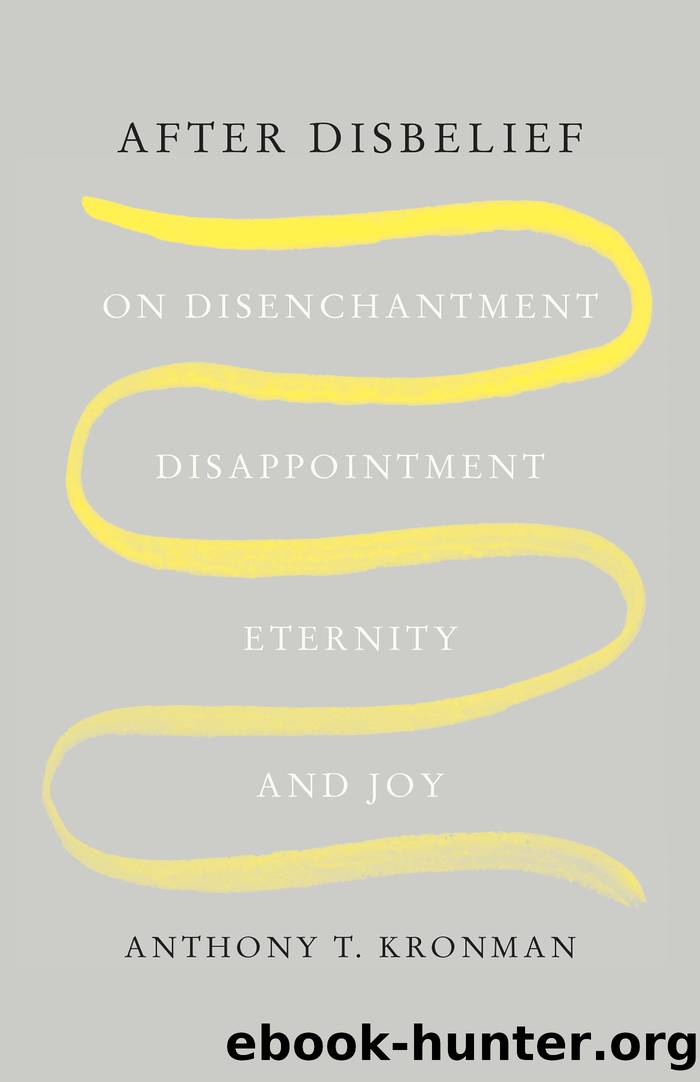After Disbelief by Anthony T. Kronman

Author:Anthony T. Kronman
Language: eng
Format: epub
Publisher: Yale University Press
Published: 2022-06-15T00:00:00+00:00
4
Prospects of Joy
MY MOTHER EXPERIENCED a more or less average mix of happiness and loss. She divorced her first husband and outlived two more. She was close to one of her sisters and estranged from the other. She loved her two boys, but under the shadow of her tormented belief that her own father, whom she adored, had never really loved her in return. On balance, though, my mother found life entirely worth living. She often said she was thrilled to be along for the ride.
Like most people, my mother took the durability of the world for granted. She found solace in the thought that her family and country would go on after she died. But she felt no need to be connected to anything eternal. She associated eternity with heaven and religion and God. She had no use for any of them.
Even the best people, my mother said, cannot look forward to a reward in heaven, or the worst to the tortures of hell. The world is all there is. One day, the small corner of the universe we call home will no longer exist. One day, the universe itself will peter out in dark, cold night, to be reborn, perhaps, in a spasm of cosmic renewalâor perhaps not.
On and on things go, flickering and flying away, mocking the brevity and inconceivable smallness of our lives. A pandemonium of extinctions without end, the world contains no eternal order immune to death and destruction that might save the fleeting times of our lives from pointlessness and oblivion. Whatever meaning we discover in life we must find or make on our own.
After she died, I found among my motherâs books a copy of Camusâs The Stranger. In an afterword, the translator summarized Camusâs view of life: âThough without purpose or meaning, life is the only thing that man has, the only reality he can know, and once he recognizes this and strips away his illusions he discovers that there is much in life he can enjoy and relish. . . . Camus places the full and terrible burden of living and dying upon the human being; he extends no hope of divine aid, of immortality; he makes each man responsible only to himself and to his fellow man for his acts and for his life. It is a grim, almost overwhelming burden, but Camus believes man is capable of shouldering it.â1
In the margins, in the slanted hand I knew so well, my mother had written, âGreat!â
She came to this view of life early on. As a young woman, my mother had already rejected the panaceas of religion that others in her family found consoling. She was an atheist long before she read Camus and Sartre and declared their existentialism to be her official philosophy of life. Camusâs extravagant claim that immortality is an illusion, and the search for it an abdication of responsibility, merely expressed in grander terms a conclusion my mother had arrived at years before.
My mother was a highly intelligent person.
Download
This site does not store any files on its server. We only index and link to content provided by other sites. Please contact the content providers to delete copyright contents if any and email us, we'll remove relevant links or contents immediately.
The remains of the day by Kazuo Ishiguro(9000)
Tools of Titans by Timothy Ferriss(8396)
Giovanni's Room by James Baldwin(7347)
The Black Swan by Nassim Nicholas Taleb(7130)
Inner Engineering: A Yogi's Guide to Joy by Sadhguru(6796)
The Way of Zen by Alan W. Watts(6614)
The Power of Now: A Guide to Spiritual Enlightenment by Eckhart Tolle(5784)
Asking the Right Questions: A Guide to Critical Thinking by M. Neil Browne & Stuart M. Keeley(5775)
The Six Wives Of Henry VIII (WOMEN IN HISTORY) by Fraser Antonia(5515)
Astrophysics for People in a Hurry by Neil DeGrasse Tyson(5190)
Housekeeping by Marilynne Robinson(4449)
12 Rules for Life by Jordan B. Peterson(4305)
Ikigai by Héctor García & Francesc Miralles(4275)
Double Down (Diary of a Wimpy Kid Book 11) by Jeff Kinney(4273)
The Ethical Slut by Janet W. Hardy(4256)
Skin in the Game by Nassim Nicholas Taleb(4250)
The Art of Happiness by The Dalai Lama(4130)
Skin in the Game: Hidden Asymmetries in Daily Life by Nassim Nicholas Taleb(4007)
Walking by Henry David Thoreau(3963)
